OpenAI, Why the Split?
![]() 08/07 2024
08/07 2024
![]() 577
577
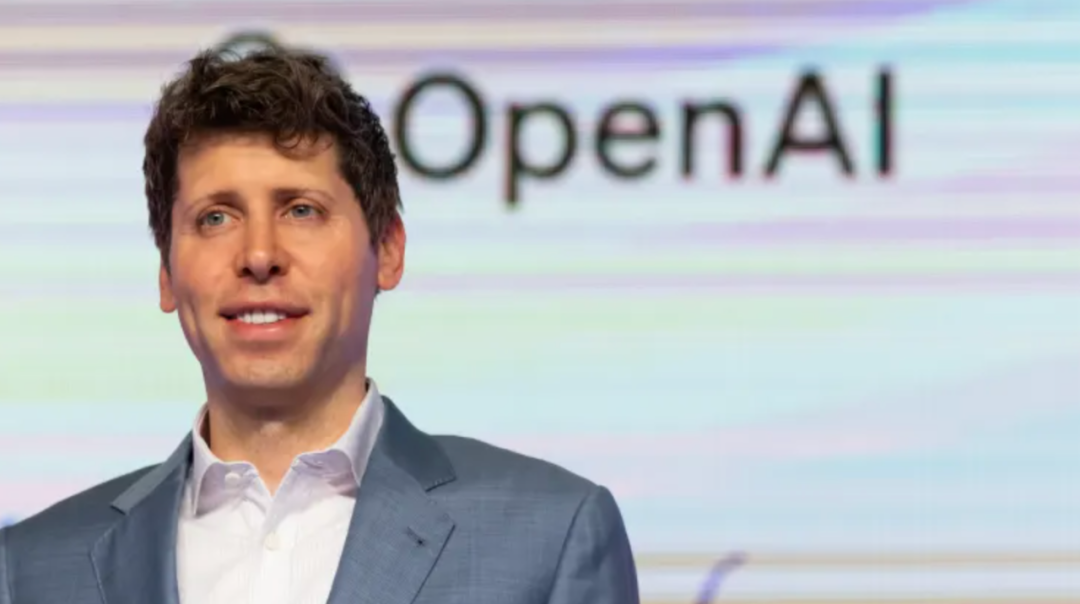
Starting from the impeachment and departure of its founder and CEO, Sam Altman, OpenAI's high-level political intrigue drama, which has lasted for nearly a year, seems far from over. Instead, it has intensified with Altman's return. The latest news is that John Schulman, OpenAI's co-founder who has long led the reinforcement learning team and alignment research, announced his departure from OpenAI, revealing his intention to join OpenAI's competitor, Anthropic. (P.S.: Alignment research aims to align AI behavior with human values and expected benefits, ensuring AI applications are safe and controllable.) Concurrently with Schulman's announcement, Greg Brockman, OpenAI's other core executive and co-founder/president, also indicated on social media that he would take a leave of absence until the end of the year. Meanwhile, TechCrunch reported that Peter Deng, OpenAI's Vice President of Products, has also left the company.
In the past year, the exodus of numerous OpenAI executives, particularly co-founders, has sparked concerns about the company's future beyond its technological miracles in AI. Is it true that people can fight together but not share the same future?
01 OpenAI: Team Turmoil Continues
Schulman announced his departure from OpenAI in a long post on social media, explaining his reasons.
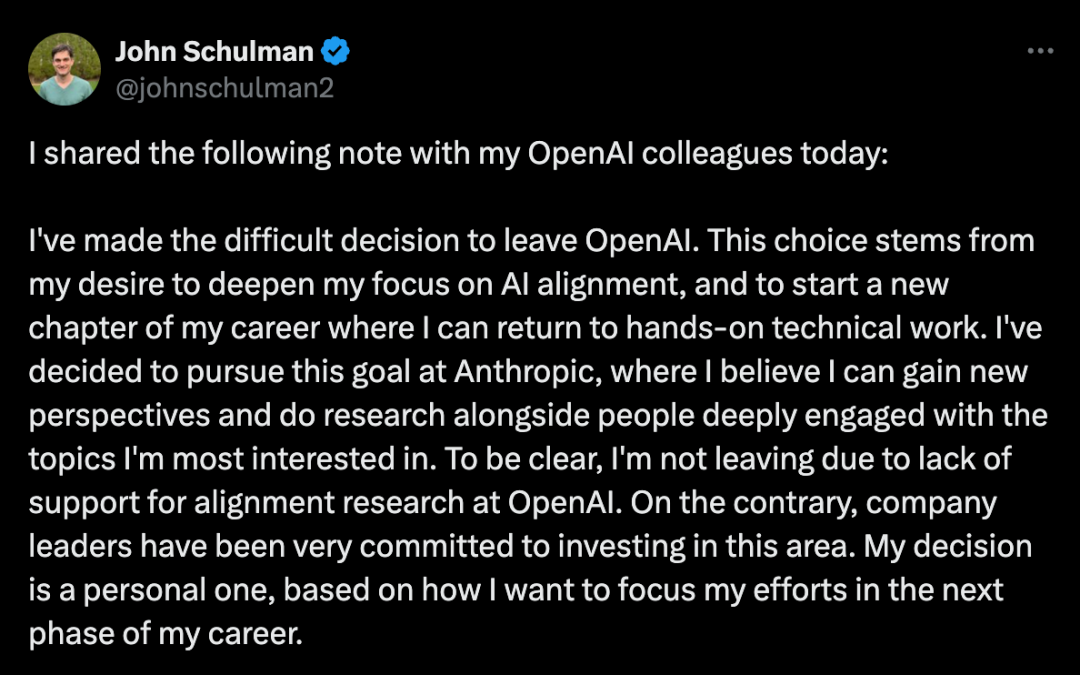
John Schulman Announces Departure from OpenAI (Partial Screenshot)He tweeted, "I've made the difficult decision to leave OpenAI. This choice stems from my desire to deepen my focus on AI alignment and begin a new chapter in my career where I can return to hands-on technical work." Schulman stressed that his departure was his choice, not due to a lack of support for alignment research at OpenAI, which has consistently invested in this area.
Regarding his next career move, Schulman revealed he would pursue his goals at Anthropic. It's worth noting that Anthropic, founded in 2021, shares OpenAI's mission to develop general AI and language models. Its founder, Dario Amodei, was previously OpenAI's VP of Research and is seen as a "defector" from OpenAI.

Anthropic Founding Team, Dario Amodei on the leftIn public statements, Amodei left OpenAI with some of its employees, including Tom Brown, a co-founder and first author of the GPT-3 paper. Despite joining a competitor founded by defectors, OpenAI's leader Altman granted Schulman a graceful exit, commenting on his departure tweet to thank him for his contributions and praise him as an outstanding researcher who contributed significantly to OpenAI's development.
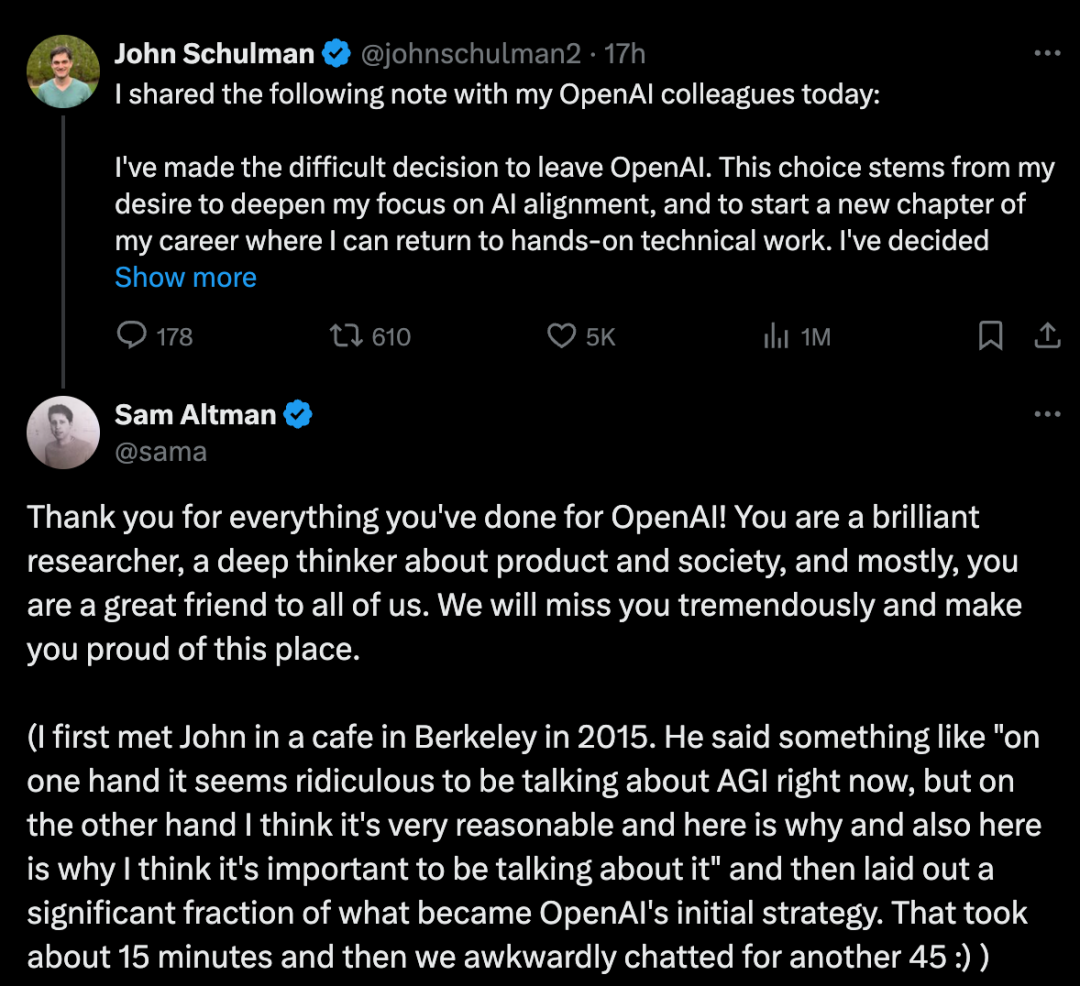
Altman Thanks SchulmanHowever, a graceful farewell cannot obscure the fact of turmoil and division within OpenAI's core team. Almost simultaneously with Schulman's announcement, Greg Brockman, OpenAI's President and co-founder, indicated on social media that he would take an extended leave of absence until the end of the year. This means Brockman will miss OpenAI's planned global Developer Day event starting October 1st. Subsequently, Brockman's tweet received a comment that subtly mentioned Andrei Karpathy, raising concerns among netizens.
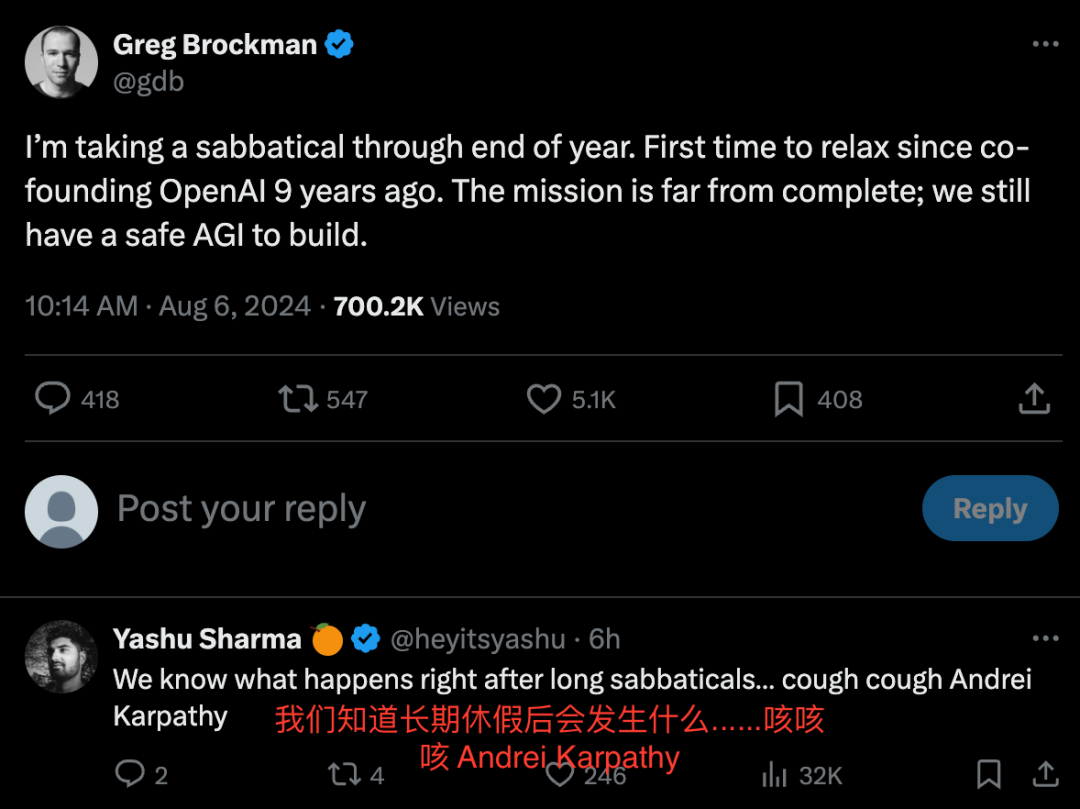
This comment is implicit, but mentioning Karpathy suggests the netizen's concerns. Karpathy, also a co-founder of OpenAI, joined Tesla as Director of AI and Autopilot Vision after over a year at OpenAI. In July 2022, Karpathy announced his departure from Tesla following a four-month leave of absence. Connecting the dots, a star company with rapidly advancing operations and core executives taking long leaves often points to a similar outcome.
After leaving Tesla, Karpathy rejoined OpenAI, but in February this year, he was reported to have left again to found an AI+education company, becoming one of the latest high-profile departures from OpenAI. In May, Ilya Sutskever, another co-founder and former Chief Scientist, disclosed his departure, hinting at an exciting new project to be shared later.
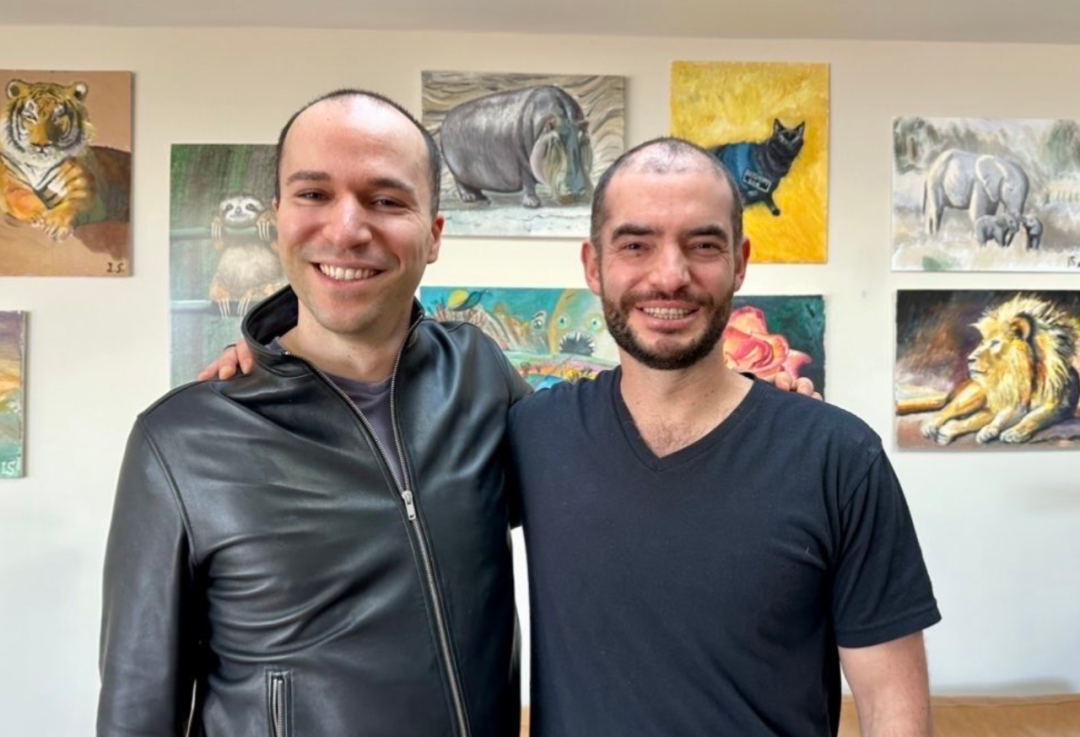
Greg Brockman (left), Ilya Sutskever (right)In June, Sutskever unveiled his new project, Safe SuperIntelligence (SSI), dedicated to developing safe superintelligence, aiming to create a secure and powerful AI system within a purely research institution. Notably, Sutskever was among those who attempted to oust Altman in November 2023, leading some to interpret this outcome as a post-coup settlement. Sutskever's departure was accompanied by Jan Leike, another leader in OpenAI's alignment research and inventor of RLHF (Reinforcement Learning from Human Feedback).
Leike's departure from OpenAI was not amicable. He criticized the company on social media for prioritizing product over safety. He later joined Anthropic, mentioned earlier. Since last year's turmoil within OpenAI, besides those already mentioned, several other executives from the alignment research team have left, including Ryan Lowe and William Saunders. Now, of OpenAI's original 11 co-founders, only Wojciech Zaremba, head of language and code generation, and Brockman (on extended leave) remain. So, what sparked OpenAI's internal turmoil over the past year? Was it simply a post-coup settlement or a clash of ideologies?
02 Safety First or Radical Technology? That is the Question
Analyzing OpenAI's exodus, we can identify two common features regarding departing roles and their subsequent destinations: Firstly, most departures, including John Schulman, Ilya Sutskever, and Jan Leike, were linked to OpenAI's alignment research team, responsible for studying AI's safe application boundaries, as explained earlier. Secondly, many joined competitors like Anthropic or founded their AI companies, like Sutskever's SSI. Both Anthropic and SSI emphasize safe AI development and pure research.
Anthropic directly defines its mission as philanthropic. This aligns with OpenAI's initial vision as a nonprofit organization aiming to prevent catastrophic AI impacts and promote positive AI applications (with Elon Musk as an early co-founder who left in 2018). In March 2019, OpenAI transitioned from nonprofit to a "capped-profit" organization, allowing venture capital and employee stock ownership. In July, Microsoft announced a $1 billion investment partnership. Since then, OpenAI flourished, stunning the industry with ChatGPT's release in November 2022, followed by exciting developments like ChatGPT iterations and Sora.
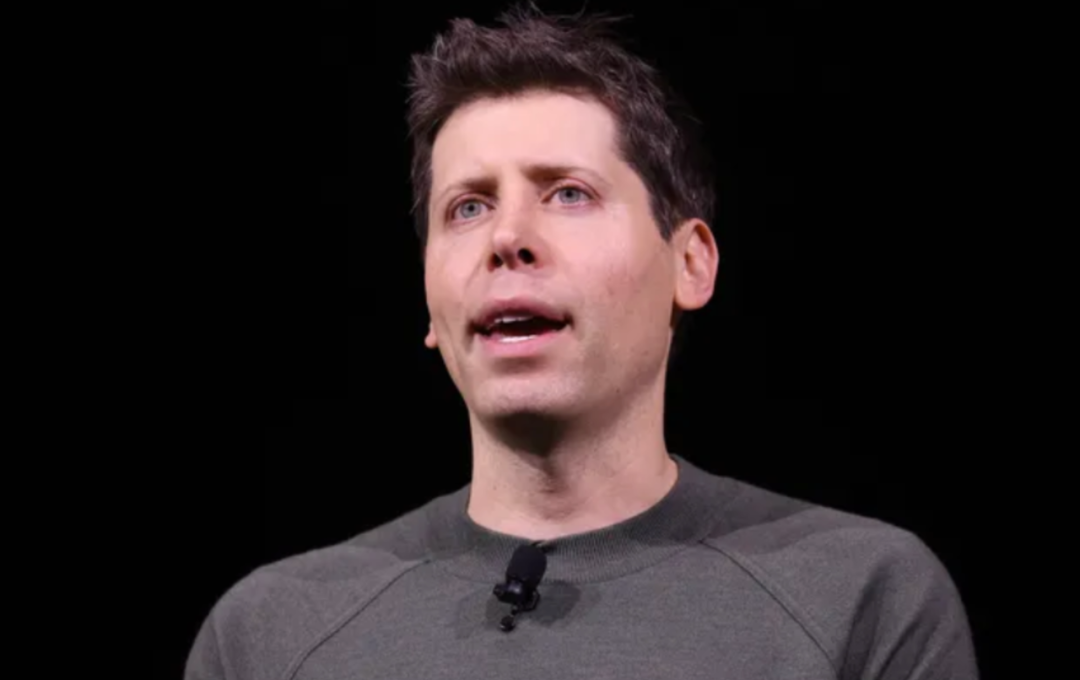
OpenAI Founder and CEO Sam AltmanShortly after, in November 2023, OpenAI abruptly ousted Altman. The situation was tumultuous, with Microsoft, as an OpenAI shareholder, even offering to bring Altman and Brockman into a new AI research team within Microsoft. Ultimately, Altman returned as CEO. Media reports linked Altman's departure to a controversial AGI (Artificial General Intelligence) project codenamed "Q," seen as potentially threatening humanity.
Ilya Sutskever, then heading super-alignment research, led the coup attempt against Altman. Similarly, Jan Leike criticized OpenAI's product safety priorities post-departure, contrary to its initial vision. OpenAI's founding team's disintegration reflects a fundamental divergence. We cannot ascertain right or wrong, but the turmoil undoubtedly impacted OpenAI, delaying projects like Sora, SearchGPT, and ChatGPT4o's voice capabilities. Meanwhile, competitors founded by OpenAI alumni pose threats.
03 Are Pioneers Doomed to Become "Wharton Schools"?
The truth remains elusive, but one thing is clear: Many OpenAI alumni have become competitors. Companies like Anthropic (founded by Dario Amodei) and SSI (led by Ilya Sutskever) are examples, among dozens of similar startups. This echoes the auto industry, where pioneering companies became talent incubators (e.g., Waymo, Baidu, Tesla).
This isn't necessarily bad. In pioneering tech markets, the transition from a cohesive team to diverse competitors follows a historical pattern, enlarging the industry pie. It breeds success stories and failures, driving technological revolutions and business legends. -END-







